2014高考英语一轮 完形填空练习(4)
2014年湖北省高考英语完形填空试题及其详细解析
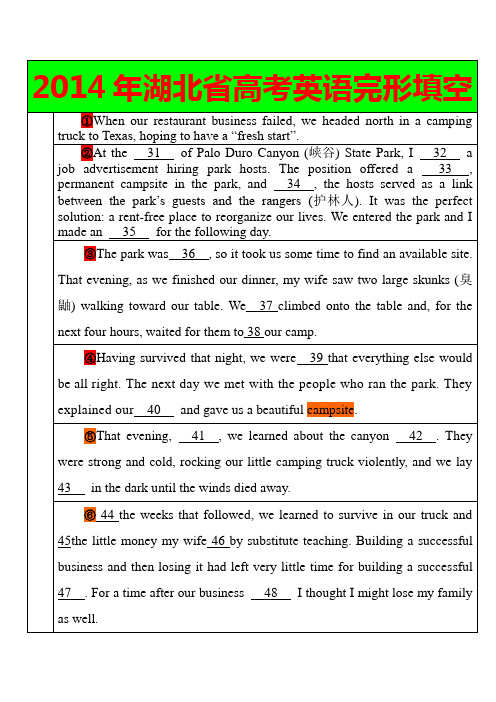
2014年湖北省高考英语完形填空①When our restaurant business failed, we headed north in a campingtruck to Texas, hoping to have a “fresh start”.②At the 31 of Palo Duro Canyon (峡谷) State Park, I 32 ajob advertisement hiring park hosts. The position offered a 33 , permanent campsite in the park, and 34 , the hosts served as a link between the park’s guests and the rangers (护林人). It was the perfect solution: a rent-free place to reorganize our lives. We entered the park and I made an 35 for the following day.③The park was 36 , so it took us some time to find an available site.That evening, as we finished our dinner, my wife saw two large skunks (臭鼬) walking toward our table. We 37 climbed onto the table and, for the next four hours, waited for them to 38 our camp.④Having survived that night, we were 39 that everything else wouldbe all right. The next day we met with the people who ran the park. They explained our 40 and gave us a beautiful campsite.⑤That evening, 41 , we learned about the canyon 42 . Theywere strong and cold, rocking our little camping truck violently, and we lay43 in the dark until the winds died away.⑥ 44 the weeks that followed, we learned to survive in our truck and45the little money my wife 46 by substitute teaching. Building a successful business and then losing it had left very little time for building a successful47 . For a time after our business 48 I thought I might lose my familyas well.⑦Living in the tiny 49 with no television, we sat close together readingand talking. One evening, standing under a jeweled sky, I found myself 50 for all the hardships. We had walked the trails and climbed the canyon walls.We had become a family!31 A back B edge C centre D entrance32A sponsored B published C noticed D answered33A safe B free C convenient D beautiful34A in return B in time C in short D in turn35A attempt B agreement C appeal D appointment36A crowded B dangerous C ideal D quiet37A repeatedly B immediately C eventually D calmly38A attack B leave C pass D search39A satisfied B determined C confident D aware40A responsibilities B requirements C circumstances D conditions41A moreover B therefore C meanwhile D however42A winds B snows C woods D trails43A shaking B quarrelling C mourning D aching44A After B Between C During D Beyond45A give away B hand out C live on D put aside46A borrowed B earned C posted D raised47A business B career C family D image48A started B failed C expanded D declined49A truck B park C house D camp50A desperate B ready C suitable D thankful【考点】考察故事类完型填空【文章大意】苦难是首歌!作者经营餐厅失败以后,全家坐着一辆货车去德克萨斯州重新开始生活。
2014年高考英语全国卷1-答案

2014年普通高等学校招生全国统一考试(全国新课标卷1)英语答案解析第Ⅰ卷第一部分听力第一节1.【答案】A【解析】由对话中女士说“This is the address. How do I find it?”可知女士想找个地方,故选A2.【答案】B【解析】由对话中男士说“I can drop you off on my way.”可知,男士将送女士一程,故选B.3.【答案】C【解析】由对话中男士说今天早上已经叫了各部门负责人到他办公室,他们需要向Mr. Peterson汇报工作。
由此可知,Mr. Peterson 是公司负责人,故选C.4.【答案】B【解析】由对话中男士说“…once I started I simply couldn’t put it down”可知男士认为书很有趣,故选B 5.【答案】A【解析】由对话中女士说都已经五月份了,还得穿御寒的衣服,男士说收音机广播了好消息,说不定从明天起女士就可以穿短裤了呢。
由此可知,谈话者在谈论天气,故选A.6.【答案】B【解析】由男士说“You know there is a basketball match on TV today. Let’s just stay home and watch it.”可知男士想要看电视,所以拒绝加入女士,故选B.7.【答案】C【解析】女士邀请男士一起打乒乓球,男士不想参加,女士最后说她和海伦一起打。
由此可知,女士接下来会做运动,故选C.8.【答案】A【解析】由“I should be home from work at 5:45.”,故选A.9.【答案】C【解析】女士说也许UME电影院七点的电影更好,Jacky Chan 主演的,男士说可以。
由此可知,谈话者要去UME电影院,故选C.10.【答案】A【解析】由“So we're leaving on Monday from Hartsfield International Airport…”可知答案.故选C.11.【答案】A【解析】对话中女士说公司安排了车送他们到机场,并且公司负责这次旅行的费用。
高中英语真题-2014高考英语一轮完形填空和阅读理解(精品)训练(6)附答案
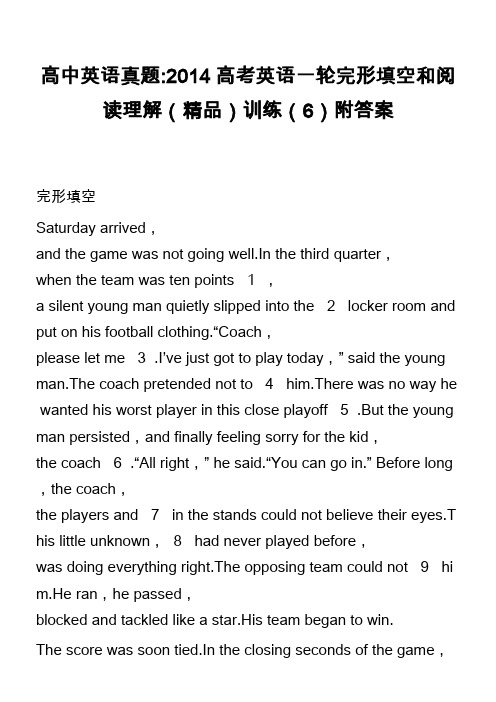
高中英语真题:2014高考英语一轮完形填空和阅读理解(精品)训练(6)附答案完形填空Saturday arrived,and the game was not going well.In the third quarter,when the team was ten points 1 ,a silent young man quietly slipped into the 2 locker room and put on his football clothing.“Coach,please let me 3 .I’ve just got to play today,” said the young man.The coach pretended not to 4 him.There was no way he wanted his worst player in this close playoff 5 .But the young man persisted,and finally feeling sorry for the kid,the coach 6 .“All right,” he said.“You can go in.” Before long ,the coach,the players and 7 in the stands could not believe their eyes.T his little unknown, 8 had never played before,was doing everything right.The opposing team could not 9 hi m.He ran,he passed,blocked and tackled like a star.His team began to win.The score was soon tied.In the closing seconds of the game,the kid intercepted(截取) a pass and 10 all the way for the winning touchdown.The fans broke loose.His 11 raised him onto their shoulders.Such cheering you’ve 12 heard!Finally,after the stands had emptied 13 the team had showered and left the locker room,the coach noticed that the young man was 14 quietly in the c orner all alone.The coach came to him and said,“Kid,I 15 believe it.You were fantastic!Tell me what got into you? 16 did you do it?” He looked at t he coach,with 17 in his eyes,and said,“Well,my dad died today,but did you know that my dad was 18 ?” The young man swa llowed hard and forced a smile,“Dad came to all my games,but today was the first 19 he could see me play,and I wanted to 20 him I could do it!”1.A.ahead B.behind C.left D.far2.A.empty B.crowdedC.large D.dark3.A.fight B.win C.strike D.play4.A.see B.likeC.hear D.respect5.A.game B.condition C.trick D.joke6.A.gave up B.put forwardC.showed off D.gave in7.A.someone B.everyoneC.anyone D.no one8.A.which B.that C.who D.what9.A.stop B.pass C.beat D.discourage10.A.ran B.fought C.pushed D.moved11.A.friends B.teammatesC.viewers D.fans12.A.still B.yet C.ever D.never13.A.for B.so C.and D.but14.A.sitting B.lyingC.training D.thinking15.A.mustn’t B.can’t C.shouldn’t D.needn’t16.A.Why B.When C.Where D.How17.A.sorrow B.pleasureC.tears D.hopes18.A.blind B.lonely C.deaf D.clever19.A.place B.timeC.chance D.game20.rm B.convinceC.impress D.show答案Ⅰ. 1.B 2.A 3.D 4.C 5.A 6.D 7.B 8.C 9.A 10.A11.B 12.D 13.C 14.A 15.B16.D 17.C 18.A 19.B 20.D*************************************************************结束Happy birthdayThe China National Opera (CNO) will give a concert to celebrat e its 50th birthday .Different generations of CNO vocalists , like Li Guangxi , Yao H ong and Ma Mei , will present the concert which will feature bot h songs from famous Chinese operas like “The White-haired Girl” and “The Hundredth Bride”, as well as , arias of suc h Western opera classics as “Madame Butterfly”,“La Traviata”and “Rigoletto”.Time/ date: 7:30 pm , September 7, 8Location : Tianqiao TheatreTel : 6551-4787, 8315-6170Tickets : 60—500 yuan (US $7.2— 60.2)Folk musicA concert will be held to feature some recently composed traditi onal Chinese music works .The concert , given by the Folk Orchestra of the China Opera a nd Ballet Theatre , will include such pieces as “Memory of Child hood ”,“Memorial Ceremony for God ”and“Wine Song”.Time/date: 7:30pm, September 13Location: Concert hall at the National Library of ChinaTel: 6848 –5462, 6841-9220Tickets: 30-200 yuan (US$3.6-24.1)Moon musicA concert of traditional Chinese music will be given on the eve of the Moon Festival which falls on September 21st this year. The concert will feature a number of famous pieces centred on t he theme of the moon, such as “Moonlight”,“Spring night on a Moonlit River” and “Lofty Mountain and Flowing River.”A number of established traditional Chinese music performers li ke Zhou Yaokun and Fan Weiqing, will play solos as well as coll aborate with the folk music orchestra.Time / date: 7:30 pm, September 21stLocation: Grand Theatre of the Cultural Palace of Nationalities Tel: 6606—8888, 6606—999958.If you want to buy tickets for listening to the music “Memor y of Childhood”, you will dial __.A.6551—4787 B.6848—5462 C.8315—6170 D.6606—999959.Which statement is right according to the passage?A.Li Guangxi, Yao Hong and Ma Mei stand for the same gene ration of CNO vocalists.B.“Rigoletto” is a famous piece on the theme of the moon.C.“Lofty Mountain and Flowing River” is a traditional Chinese music.D.Zhou Yaokun will play solos and Fan Weiqing will collaborat e with the folk music orchestra.60.“Ma dame Butterfly” is .A.a Chinese opera B.a Western opera C a piece of music D.a song61.In which column of a newspaper will the article be publishe d?A.Entertainment. B.People. C.Culture. D .Sports.参考答案----------58---61 BCBA*************************************************结束The original plans for the park were on 8 acres next to the Bur bank studios where his employees and families could go to rela x. Although, World War II put those plans on hold. During the w ar, Disney had time to come up with new ideas, and creations for his magical park. It was soon clear that 8 acres wouldn't be e nough.Finally in 1953, he had the Stanford Research Institute condu ct a survey for a 100-acre site, outside of Los Angeles. He needed space to build rive rs, waterfalls, and mountains; he would have flying elephants a nd giant teacups; a fairy-tale castle, moon rockets, and a scenic railway; all inside a mag ic kingdom he called "Disneyland."The search for the best venue for the park ended in the rural A naheim, California with a purchase of a 160-acre orange grove near the junction of the Santa Ana Freeway ( I-5) and Harbor Boulevard.Construction for Disneyland began on July 21, 1954, 12 months before the park was scheduled to ope n.Some 160-acres of citrus trees had been cleared and 15 houses moved to make room for the park. However, when the real designing cam e around, Disney met with inevitable questions. How do you ma ke believable wild animals, that aren't real? How do you make a Mississippi paddle ship? How do you go about building a huge castle in the middle of Anaheim, California? Disney asked his movie studio staff for answers. The design of Disneyland was so mething never done before. There would be four uniquely diffe rent theme parts: Adventureland, Frontierland, Fantasyland To morrow land. Bit by bit, Disneyland got ready for Opening Day. The staff worked around the clock to get ready.But opening day was a terrible disaster. Besides the terrible o pening day conditions, the park did eventually pick up. By 1965, ten years after opening day, 50 Million visitors had come throu gh the gates.36. The passage is mainly about___________.A. How Disneyland came into beingB. The difficulties Disney met in building DisneylandC. What visitors can enjoy in Disneyland.D. A brief introduction to Disneyland37. Which of the following dates would probably be the opening date of Disneyland?A. 1953B. 1954C. 1955D. 196538. Which of the following statements is Not True?A. World War II had some influence on the building plan of th e Disneyland.B. Disney must have met many difficulties in building Disneyla nd.C. Disney was a great man with great imagination and creativi ty.D. About 50 million visitors have visited Disneyland so far.39. The underlined phrase in the last paragraph probably mean s _________.A. collectB. improveC. findD. open参考答案-----------A. ACDB************************************************************结束(2011·石家庄二模)Twenty years ago,I drove a taxi for a living. I met __1__ people. But none touche d me __2__ than a woman I picked up late one night.I received a call from __3__ in a quiet part of town. When I arri ved at 2:30 a. m. ,the building was __4__ except for a single light in a ground flo or window. I walked to the door and __5__. “Just a minute,”a nswered a __6__,elderly voice. After a long pause,the door opened. A small woman __7__ her 80s stood before me. Beside her was a small suitcase. I took it to the taxi, and th en returned to __8__ the woman. She took my arm and we walked __9__ toward the roadside.Seated ,she gave me __10__. “I'm on my way to a hospice(临终关怀医院). I'm in no hurry. Can you drive through downtown?” I saw h er eyes shining with __11__ in the rearview mirror.“I don't hav e any __12__ left. ”she continued.“The doctor says I don't have very long.”During the next two hours' __13__,sometimes she asked me to __14__ in front of a particular build ing or corner and she __15__ stare into the darkness. When we got to the destination,she asked,“How much do I __16__ you?”“Nothing,” I said. “You __17_ _ make a living. ”she answered. “I have __18__ passengers,”I replied,and gave her a hug. She held onto me __19__. “You gave an ol d woman a little moment of joy,” she said. “Thank you.”After that, I drove aimlessly,lost in thought. People usually believe that our lives center upon great moments. __20__ great moments often catch us unaware , beautifully wrapped in what others may consider a small one. 20多年开出租车的生涯,“我”阅人无数,但唯有20年前的一个深夜“我”接一位老妇人去临终关怀医院的经历深深地触动了“我”的灵魂,令“我”难以忘怀……1.A. honest B. familiarC. variousD. similar答案:C。
2014高考英语一轮复习 自选训练完形填空14含答案
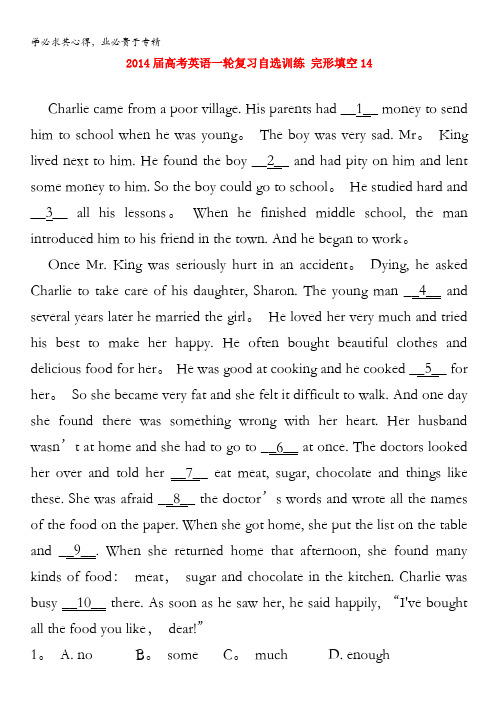
2014届高考英语一轮复习自选训练完形填空14Charlie came from a poor village. His parents had __1__ money to send him to school when he was young。
The boy was very sad. Mr。
King lived next to him. He found the boy __2__ and had pity on him and lent some money to him. So the boy could go to school。
He studied hard and __3__ all his lessons。
When he finished middle school, the man introduced him to his friend in the town. And he began to work。
Once Mr. King was seriously hurt in an accident。
Dying, he asked Charlie to take care of his daughter, Sharon. The young man __4__ and several years later he married the girl。
He loved her very much and tried his best to make her happy. He often bought beautiful clothes and delicious food for her。
He was good at cooking and he cooked __5__ for her。
So she became very fat and she felt it difficult to walk. And one day she found there was something wrong with her heart. Her husband wasn’t at home and she had to go to __6__ at once. The doctors looked her over and told her __7__ eat meat, sugar, chocolate and things like these. She was afraid __8__ the doctor’s words and wrote all the names of the food on the paper. When she got home, she put the list on the table and __9__. When she returned home that afternoon, she found many kinds of food:meat,sugar and chocolate in the kitchen. Charlie was busy __10__ there. As soon as he saw her, he said happily, “I've bought all the food you like,dear!”1。
2014高考英语完形填空练习(4)及答案
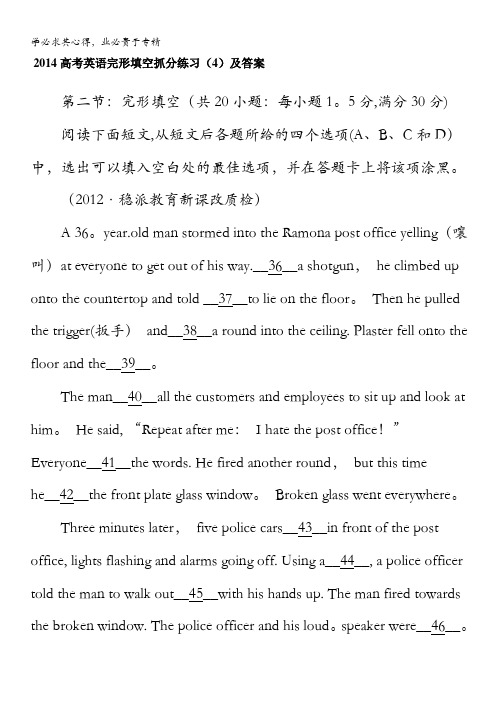
2014高考英语完形填空抓分练习(4)及答案第二节:完形填空(共20小题:每小题1。
5分,满分30分)阅读下面短文,从短文后各题所给的四个选项(A、B、C和D)中,选出可以填入空白处的最佳选项,并在答题卡上将该项涂黑。
(2012·稳派教育新课改质检)A 36。
year.old man stormed into the Ramona post office yelling(嚷叫)at everyone to get out of his way.__36__a shotgun,he climbed up onto the countertop and told __37__to lie on the floor。
Then he pulled the trigger(扳手)and__38__a round into the ceiling. Plaster fell onto the floor and the__39__。
The man__40__all the customers and employees to sit up and look at him。
He said, “Re peat after me:I hate the post office!” Everyone__41__the words. He fired another round,but this timehe__42__the front plate glass window。
Broken glass went everywhere。
Three minutes later,five police cars__43__in front of the post office, lights flashing and alarms going off. Using a__44__, a police officer told the man to walk out__45__with his hands up. The man fired towards the broken window. The police officer and his loud。
2014高考英语(北京卷)完形填空真题含答案详解
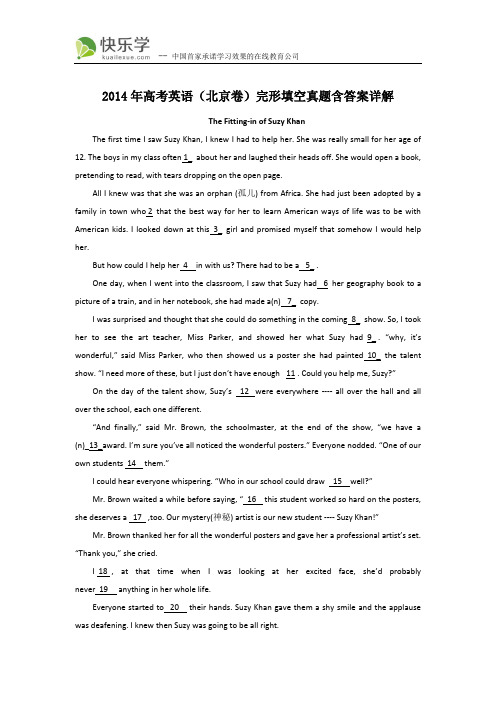
2014年高考英语(北京卷)完形填空真题含答案详解The Fitting-in of Suzy KhanThe first time I saw Suzy Khan, I knew I had to help her. She was really small for her age of 12. The boys in my class often 1_ about her and laughed their heads off. She would open a book, pretending to read, with tears dropping on the open page.All I knew was that she was an orphan (孤儿) from Africa. She had just been adopted by a family in town who 2 that the best way for her to learn American ways of life was to be with American kids. I looked down at this 3_ girl and promised myself that somehow I would help her.But how could I help her 4 in with us? There had to be a 5_ .One day, when I went into the classroom, I saw that Suzy had 6 her geography book to a picture of a train, and in her notebook, she had made a(n) 7_ copy.I was surprised and thought that she could do something in the coming 8_ show. So, I took her to see the art teacher, Miss Parker, and showed her what Suzy had 9_ . “why, it’s wonderful,” said Miss Parker, who the n showed us a poster she had painted 10_ the talent show. “I need more of these, but I just don’t have enough11 . Could you help me, Suzy?”On the day of the talent show, Suzy’s 12 were everywhere ---- all over the hall and all over the school, each one different.“And finally,” said Mr. Brown, the schoolmaster, at the end of the show, “we have a (n)_13_award. I’m sure you’ve all noticed the wonderful posters.” Everyone nodded. “One of our own students 14 them.”I could hear everyone whispering. “Who in our school could draw 15 well?”Mr. Brown waited a while before saying, “ 16 this student worked so hard on the posters, she deserves a 17 ,too. Our mystery(神秘) artist is our new student ---- Suzy Khan!”Mr. Brown thanked her for all the wonderful posters and gave her a professional artist’s set. “Thank you,” she cried.I 18 , at that time when I was looking at her excited face, she’d probably never 19 anything in her whole life.Everyone started to 20 their hands. Suzy Khan gave them a shy smile and the applause was deafening. I knew then Suzy was going to be all right.1. A. joked B. cared C. trains D. worried2. A. reported B. decided C. complained D. questioned3. A. rich B. proud C. tiny D. popular4. A. come B. fall C. fit D. tie5. A. manner B. pattern C. choice D. way6. A. read B. taken C. opened D. put7. A. free B. perfect C. final D. extra8. A. art B. talk C. quiz D. talent9. A. colored B. written C. carved D. drawn10. A. at B. after C. for D. around11. A. room B. time C. paper D. interest12. A. gifts B. books C. photos D. posters13. A. special B. academic C. national D. royal14. A. painted B. found C. printed D. collected15. A. very B. that C. quite D. too16. A. If B. Though C. Unless D. Since17. A. prize B. rank C. rest D. place18. A. replied B. realized C. remembered D. regretted19. A. offered B. valued C. owned D. controlled20. A. clap B. wave C. raise D. shake答案与解析:1. A.根据___ about her and laugh their heads off可知,and表示并列,因此前后意思是同类型的,and后面是laugh,由此可知,and前面也应该是和laugh有关的,故选joked,意为“开玩笑”。
高中英语真题-2014高考英语一轮完形填空和阅读理解基本训练(4)附答案

高中英语真题:2014高考英语一轮完形填空和阅读理解基本训练(4)附答案When someone says, “Well, I guess I’ll have to go to face the music,” it does not mean he is planning to go to a concert. It is something far less pleasant, like being called in by your boss to explain why you did this or that, and why you did not do this or that. Sour music, indeed, but it has to be faced.The phrase “to face the music” is familiar to every America n, young and old. It is at least 100 years old.The first information comes from the American writer Jame s Fenimore Cooper. He said—in 1851—that the expression was first used by actors while waiting in the wings to go on stage. After they got their cue(提示,暗示) to go on, they often said, “It’s time to go to face the music.”And that is exactly what they did—face the orchestra which was just below the stage.An actor might be frightened or nervous as he moved on t o the stage in front of the audience that might be friendly or per haps unfriendly, especially if he forgot his lines. But he had to g o out. So, “to face the music” came to mean having to go throug h something, no matter how unpleasant the experience might be, because you knew you had no choice.The other explanation comes from the army. Men had to f ace inspection by their leader. The soldiers worried about how well they looked. Was their equipment clean—shiny enough to pass inspection? Still, the men had to go out, a nd face the music of the band, as well as the inspection. What e lse could they do?64. According to the passage, the word “music” means_____ .A. your boss’s criticism(批评) B. your leader’s inspectionC. something unpleasant to be experiencedD. sour pop music65. The phrase “to face the music” was first used by______.A. some American actorsB. the American writer James Feni more CooperC. all the AmericansD. the American orchestra66. An actor might feel frightened or nervous when going on sta ge. One of thereasons is that______.A. his performance might not satisfy most of the audienceB. he might not remember what he should say on stageC. he had to face the unfriendly audienceD. most of the audience might be his friendsCancer is among the top killer diseases in our society toda y and scientists have found out that stress(紧张) helps to bring it on. We need to consider, therefore, what ar e the causes of stress in our life, and whether we can do anythi ng about them.Are we under-employed, or overburdened(负担过重) with too many responsibilities? Do we have a right balance of work and leisure(闲散) in our lives? Are our relationships with family, friends or fello w workers all that they should be?All these things can be a cause of stress, and it is best to f ace them directly, and to bring our frustrations(失意) into the open. People who have a good row and then forget it are doing their health more good than those who bottle up the ir feelings.If our self-examination has brought any causes of stress to light, let us co nsider what we can do about them. It is possible to change jobs. We can make more leisure and fill it more happily, if we will ac cept a different living standard. We can improve our personal re lationships by a different attitude. It is we who allow other peopl e to make ourselves unhappy. Often the little things that disturb us are not worth an hour’s anger. The teaching in the Bible “Let not the sun go down upon your wrath(愤怒)” is good advice from the health point of view as well as religi on.67. Which of the following statements is true?A. Freedom from responsibilities helps reduce stress.B. Stress is the direct cause of caner.C. The causes of stress are worth serious study.D.Cancer is the number one killer is our society today.68. Judging from the context, the underlined word “row” in the t hird paragraphmost probably means______.A. a noisy quarrelB. a very loud noiseC. a neat line of things side by sideD. a journey in a boat69. Which of the following is not mentioned as a way to reduce our stress?A. Changing our jobs.B. Changing our attitude about little things that make us unhappy.C. Speaking out about our frustrations.D. Reading the Bible.70. “Let not the sun go down upon your wrath” probably means “______”.A. Don’t let your anger last long.B. Don’t get angry while the sun is going down.C. Don’t get angry easily about little things.D. Don’t watch the sun set while you are angry.(2011·江西卷)What a busy day! The three boys were fed, bathed and change d into their nightclothes.Mary had __1__ them a story and finally they were asleep. “Ba bysitting (照看)the three boys aged eight, six and four is extremely __2__,” she thought.“Sleep,”she considered, “if only I could! ”But she had difficult h omework to complete. Leaning back, she __3__ her feet onto th e sofa to get comfortable. Whoever said babysitting was a(n) __ 4__ way to make money obviously hadn't met the three boys, s he thought. The television was on, the room was warm, and thelights were dim. Mary's __5__ felt heavier and heavier. I mustn't sleep, she thought—which was __6__ what she did, of course. Strangely enough, she soon __7__ that she was a worldfamous chef(主厨). She made a __8__ and wore diamonds and designer clothe s. Most days she relaxed by the pool, meeting the rich and fam ous or __9__ —her favorite hobby. She __10__ took the leading role in her own TV show.That is, until she became too __11__. “I am definitely the best in the world, ”she thought, as she prepared a tasty chicken dish. But __12__ seemed to go right. She spilt the flour, she dropped an egg and she cut her finger.Despite all the troubles, she __13 __ to get the chicken into the stove. Soon, smoke blanketed the room. The chicken was on fire. __14__ set in, but Mary could n ot run—she was __15__ to the spot. She tried hard to move, but could n ot, __16__ a sharp sound awoke her.She got shocked and confused—__17__ was pouring from the kitchen. Rushing to investigate, sh e was met by three __18__ little faces and some very burnt brea d. “Sorry, we were hungry and you were __19__, so we tried t o make some bread,” explained a boy. Relieved, Mary made them a snack and sent them back to bed. She __20__ them nev er to fall asleep on the job again!本文是一篇记叙文,记叙了作者当保姆照顾三个男孩的经历。
高考英语《完形填空》专项练习(四)带答案和解析
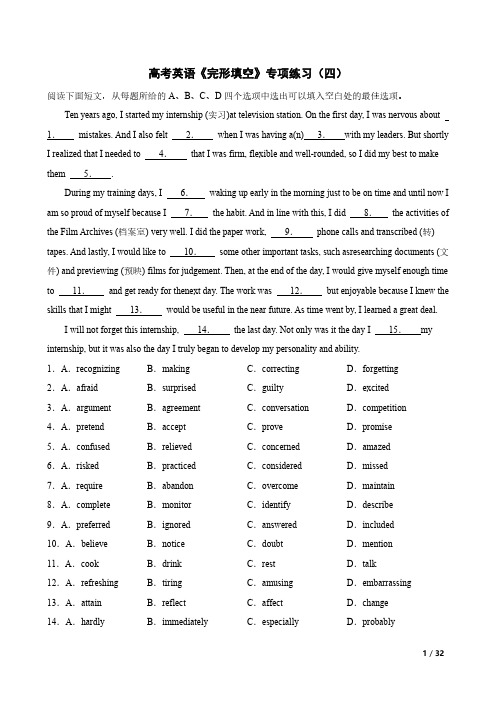
高考英语《完形填空》专项练习(四)阅读下面短文,从每题所给的A、B、C、D四个选项中选出可以填入空白处的最佳选项。
Ten years ago,I started my internship(实习)at television station.On the first day,I was nervous about 1.mistakes.And I also felt2.when I was having a(n)3.with my leaders.But shortly I realized that I needed to4.that I was firm,flexible and well-rounded,so I did my best to make them5..During my training days,I6.waking up early in the morning just to be on time and until now I am so proud of myself because I7.the habit.And in line with this,I did8.the activities of the Film Archives(档案室)very well.I did the paper work,9.phone calls and transcribed(转) tapes.And lastly,I would like to10.some other important tasks,such asresearching documents(文件)and previewing(预映)films for judgement.Then,at the end of the day,I would give myself enough time to11.and get ready for thenext day.The work was12.but enjoyable because I knew the skills that I might13.would be useful in the near future.As time went by,I learned a great deal.I will not forget this internship,14.the last day.Not only was it the day I15.my internship,but it was also the day I truly began to develop my personality and ability. 1.A.recognizing B.making C.correcting D.forgetting 2.A.afraid B.surprised C.guilty D.excited 3.A.argument B.agreement C.conversation D.competition 4.A.pretend B.accept C.prove D.promise 5.A.confused B.relieved C.concerned D.amazed 6.A.risked B.practiced C.considered D.missed 7.A.require B.abandon C.overcome D.maintain 8.A.complete B.monitor C.identify D.describe 9.A.preferred B.ignored C.answered D.included 10.A.believe B.notice C.doubt D.mention 11.A.cook B.drink C.rest D.talk 12.A.refreshing B.tiring C.amusing D.embarrassing 13.A.attain B.reflect C.affect D.change 14.A.hardly B.immediately C.especially D.probably15.A.confirmed B.ended C.earned D.expanded阅读下面短文,从短文后各题所给的A、B、C和D四个选项中,选出可以填入空白处的最佳选项。
超实用高考英语复习:2014年全国1卷完形填空- 完形填空重难点词组整理
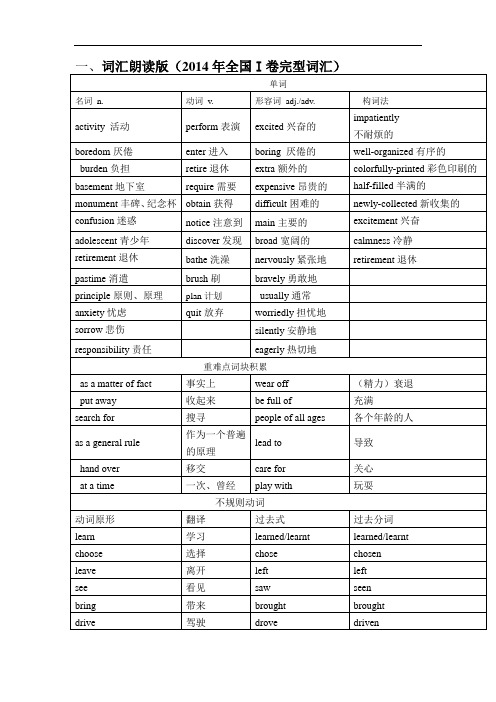
二、2014年全国I卷完型第一节完形填空(共20 小题;每小题两分,满分40分)阅读下面短文,从短文后各题所给的四个选项(A,B,C,D)中,选出可以填入空白处的最佳选项,并在答题卡上将该项涂黑。
As a general rule, all forms of activity lead to boredom when they are performed on a routine(常规)basis. As a matter of fact, we can see this 41 at work in people of all42 . For example, on Christmas morning, children are excited about 43 with their new toys. But their 44 soon wears off and by January those 45 toys can be found put away in the basement. The world is full of 46 stamp albums and unfinished models, each standing as a monument to someone’s47 interest. When parents bring home a pet, their child48 bathes it and brushes its fur. Within a short time, however, the49 of caring for the animal is handed over to the parents. Adolescents enter high school with great50 but are soon looking forward to51 . The same is true of the young adults going to college. And then, how many52 , who now complain(抱怨)about the long drives to work, 53 drove for hour at a time when they first 54 their driver’s licenses (执照)? Before people retire, they usually55 to do a lot of56 things, which they never had57 to do while working. But 58 after retirement, the golfing, the fishing, the reading and all of the other pastimes become as boring as the jobs they59 . And, like the child in January, they go searching for new 60 .41. A. habit B. principle C. way D. power42. A. parties B. races C. countries D. ages43. A. working B. living C. playing D. going44. A. confidence B. interest C. anxiety D. sorrow45. A. same B. extra C. funny D. expensive46. A. well-organized B. colorfully-printed C. half-filled D. newly-collected47. A. broad B. passing C. different D. main48. A. silently B. impatiently C. worriedly D. gladly49. A. promise B. burden C. right D. game50. A. courage B. calmness C. confusion D. excitement51. A. graduation B. independence C. responsibility D. success52. A. children B. students C. adults D. retirees53. A. carefully B. eagerly C. nervously D. bravely54. A. required B. obtained C. noticed D. discovered55. A. need B. learn C. plan D. start56. A. great B. strange C. difficult D. correct57. A. time B. money C. skills D. knowledge58. A. only B. well C. even D. soon59. A. lost B. chose C. quit D. left60. A. pets B. toys C. friends D. colleagues.二、词汇检测版(2014年全国I卷完型词汇,满分100分)高考质量提升是一项系统工程,涉及到多个方面、各个维度,关键是要抓住重点、以点带面、全面突破,收到事半功倍的效果。
高考英语全国卷2014 I 卷完形填空翻译与解析
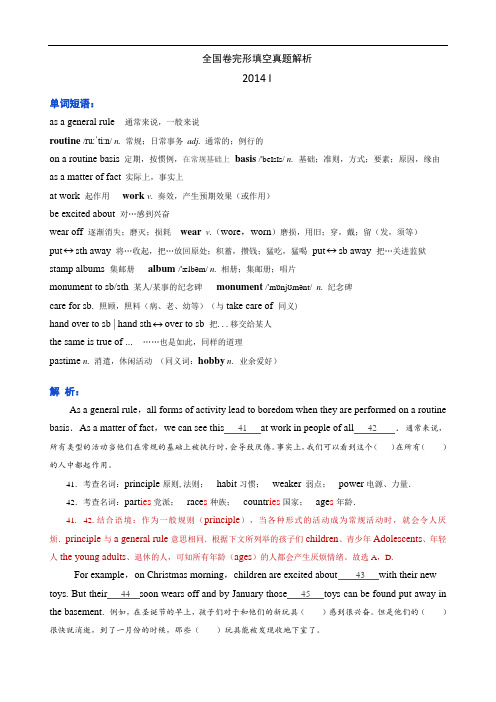
全国卷完形填空真题解析2014 I单词短语:as a general rule 通常来说,一般来说routine /ru:ˈti:n/ n.常规;日常事务adj.通常的;例行的on a routine basis定期,按惯例,在常规基础上basis/'beɪsɪs/ n.基础;准则,方式;要素;原因,缘由as a matter of fact实际上,事实上at work 起作用work v. 奏效,产生预期效果(或作用)be excited about 对…感到兴奋wear off 逐渐消失;磨灭;损耗wear v.(wore,worn)磨损,用旧;穿,戴;留(发,须等)put↔sth away 将…收起,把…放回原处;积蓄,攒钱;猛吃,猛喝put↔sb away 把…关进监狱stamp albums 集邮册album/'ælbəm/ n. 相册;集邮册;唱片monument to sb/sth 某人/某事的纪念碑monument /'mɒnjʊmənt/n. 纪念碑care for sb. 照顾,照料(病、老、幼等)(与take care of 同义)hand over to sb | hand sth↔over to sb 把...移交给某人the same is true of ... ……也是如此,同样的道理pastime n. 消遣,休闲活动(同义词:hobby n.业余爱好)解析:As a general rule,all forms of activity lead to boredom when they are performed on a routine basis.As a matter of fact,we can see this41 at work in people of all42 .通常来说,所有类型的活动当他们在常规的基础上被执行时,会导致厌倦。
2014高考英语完形填空专题训练极品题(4)及答案
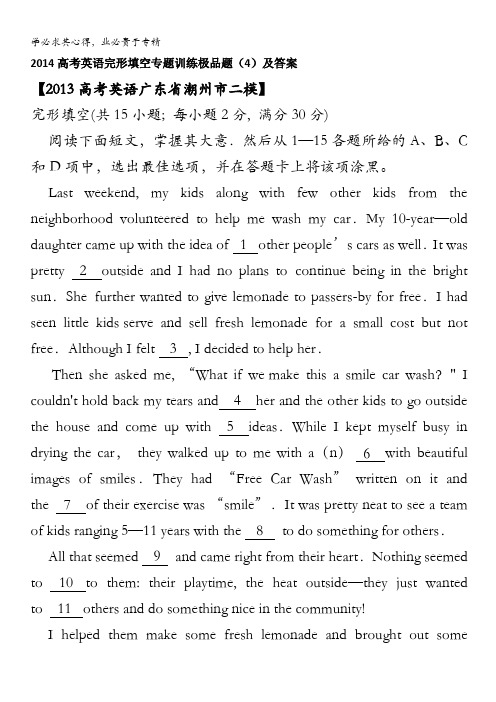
2014高考英语完形填空专题训练极品题(4)及答案【2013高考英语广东省潮州市二模】完形填空(共15小题; 每小题2分, 满分30分)阅读下面短文,掌握其大意.然后从1—15各题所给的A、B、C 和D项中,选出最佳选项,并在答题卡上将该项涂黑。
Last weekend, my kids along with few other kids from the neighborhood volunteered to help me wash my car.My 10-year—old daughter came up with the idea of 1 other people’s cars as well.It was pretty 2 outside and I had no plans to continue being in the bright sun.She further wanted to give lemonade to passers-by for free.I had seen little kids serve and sell fresh lemonade for a small cost but not free.Although I felt 3 , I decided to help her.Then she asked me, “What if we make this a smile car wash?" I couldn't hold back my tears and 4 her and the other kids to go outside the house and come up with 5 ideas.While I kept myself busy in drying the car,they walked up to me with a(n) 6 with beautiful images of smiles.They had “Free Car Wash” written on it and the 7 of their exercise was “smile”.It was pretty neat to see a team of kids ranging 5—11 years with the 8 to do something for others.All that seemed 9 and came right from their heart.Nothing seemed to 10 to them: their playtime, the heat outside—they just wanted to 11 others and do something nice in the community!I helped them make some fresh lemonade and brought out someadditional 12 to help clean cars.Passers-by were 13 and one even shouted back to them saying “God Bless You,my kids…” One of them even tried giving them 5 dollars,which they refused.A pretty heartwarming 14 !I feel blessed by being 15 by such wonderful and loving souls.1.A.drying B.washing C.repairing D.decorating 2.A.warm B.hot C.cold D.cool 3.A.worried B.popular C.confused D.difficult 4.A.challenged B.expected C.invited D.encouraged5.A.creative B.ready C.difficult D.familiar 6.A.picture B.idea C.board D.car7.A.theme B.trouble C.secret D.purpose 8.A.order B.duty C.imagination D.need 9.A.important B.disappointing C.hopeful D.natural10.A.matter B.mean C.belong D.refer 11.A.relax B.try C.help D.smile 12.A.rags B.food C.money D.fruit 13.A.interested B.bored C.amazed D.frightened14.A.scenery B.scene C.story D.view 15.A.supported B.understood C.refusedD.surrounded文章摘要“在作者女儿的倡议下,几个孩子们自发地奉献他们的爱心,组织了一次主题为“微笑”的活动-————帮助别人洗车,并为路人提供柠檬汽水。
2014年高考英语(第01期)大题狂做系列04(含解析)
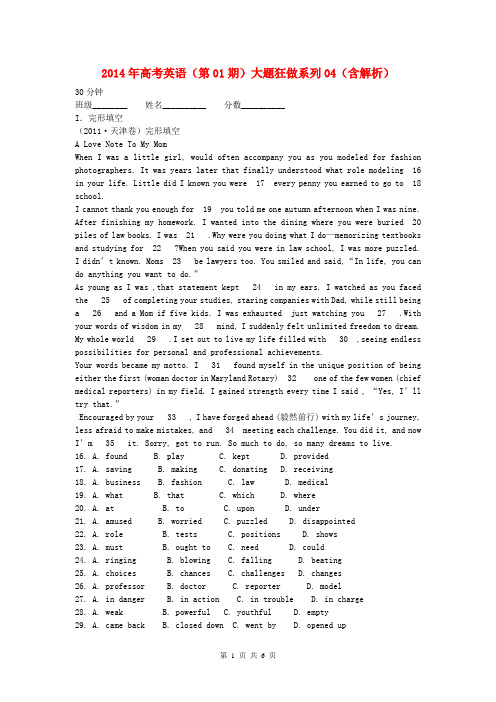
2014年高考英语(第01期)大题狂做系列04(含解析)30分钟班级________ 姓名__________ 分数__________I.完形填空(2011·天津卷)完形填空A Love Note To My MomWhen I was a little girl, would often accompany you as you modeled for fashion photographers. It was years later that finally understood what role modeling 16 in your life. Little did I known you were 17 every penny you earned to go to 18 school.I cannot thank you enough for 19 you told me one autumn afternoon when I was nine. After finishing my homework. I wanted into the dining where you were buried 20 piles of law books. I was 21 .Why were you doing what I do—memorizing textbooks and studying for 22 ?When you said you were in law school, I was more puzzled.I didn’t known. Moms 23 be lawyers too. You smiled and said,“In life, you can do anything you want to do.”As young as I was ,that statement kept 24 in my ears. I watched as you faced the 25 of completing your studies, staring companies with Dad, while still beinga 26 and a Mom if five kids. I was exhausted just watching you 27 .With your words of wisdom in my 28 mind, I suddenly felt unlimited freedom to dream. My whole world 29 .I set out to live my life filled with 30 ,seeing endless possibilities for personal and professional achievements.Your words became my motto. I 31 found myself in the unique position of being either the first (woman doctor in Maryland Rotary) 32 one of the few women (chief medical reporters) in my field. I gained strength every time I said , “Yes, I’ll try that.”Encouraged by your 33 , I have forged ahead (毅然前行) with my life’s journey, less afraid to make mistakes, and 34 meeting each challenge. You did it, and now I’m 35 it. Sorry, got to run. So much to do, so many dreams to live.16. A. found B. play C. kept D. provided17. A. saving B. making C. donating D. receiving18. A. business B. fashion C. law D. medical19. A. what B. that C. which D. where20. A. at B. to C. upon D. under21. A. amused B. worried C. puzzled D. disappointed22. A. role B. tests C. positions D. shows23. A. must B. ought to C. need D. could24. A. ringing B. blowing C. falling D. beating25. A. choices B. chances C. challenges D. changes26. A. professor B. doctor C. reporter D. model27. A. in danger B. in action C. in trouble D. in charge28. A. weak B. powerful C. youthful D. empty29. A. came back B. closed down C. went by D. opened up30. A. hope B. hardship C. harmony D. sadness31. A. constantly B. shortly C. hardly D. nearly32. A. and B. but C. or D. for33. A. description B. statement C. praise D. introduction34. A. secretly B. curiously C. carelessly D. eagerly35. A. doing B. considering C. correcting D. reading26.D 考查名词。
2014年高考英语完形填空真题及答案

2014年⾼考英语完形填空真题及答案 (⼀)北京2004 Don’t Take the Fun Out of Youth Sports When I joined a private football league a few years ago, the sport meant everything to me. My coach said that I had lots of potential, and I became captain of my 1 . That was before all the fun was taken out of 2 . At first, everyone on the team got 3 playing time. Then the team moved up to the top division after winning all its games, and the 4 started. Some parents, who had paid the coach extra so their daughters could have 5 one-on-one training, got angry when she didn’t give them more playing time in our 6 . The coach was replaced. The new coach, however, took all the fun out of the game: all we did during practice was 7 . I always wished to God that it would rain so we would not have the 8 . Of course, all teams run drills; they are 9 . But we ran so much that, afterwards, we had trouble 10 . Younger people shouldn’t be doing exercises 11 for 18-year-olds. I was very thin 12 I started football, but as a member of this team I wouldn’t eat much, because I was afraid of being too 13 to run. I feared making mistakes, and the added pressure caused me to make more than my usual 14 . Is all this pressure necessary? I 15 up leaving the football team. Four other girls did the same, and two of them stopped playing football completely. That’s 16 , because they had so much potential. They were just burned-out with all the pressure they 17 from the coach or their parents. I continued playing football at school and 18 my love for it. I joined a private team coached by my school coach. When I started playing 19 him, he told me I needed to relax because I looked nervous. After I 20 down, I played better. When you enjoy something, it’s a lot easier to do it well. 1. A. class B. club C. team D. board 2. A. playing B. living C. learning D. working 3. A. great B. equal C. right D. extra 4. A. business B. struggle C. attempt D. pressure 5. A. free B. private C. good D. basic 6. A. matches B. courses C. lessons D. programs 7. A. jump B. play C. run D. shoot 8. A. duty B. meeting C. operation D. training 9. A. necessary B. boring C. scientific D. practical 10. A. speaking B. moving C. sleeping D. breathing 11. A. used B. intended C. made D. described 12. A. till B. since C. before D. because 13. A. full B. tired C. lazy D. big 14. A. size B. share C. space D. state 15. A. gave B. kept C. ended D. picked 16. A. sad B. shameful C. silly D. serious 17. A. received B. suffered C. brought D. felt 18. A. reconsidered B. rediscovered C. re-formed D. replaced 19. A. at B. by C. for D. around 20. A. fell B. stepped C. slowed D. calmed (⼆)湖南2004 I grew up in a community called Estepona. I was 16 when one morning, Dad told me I could drive him into a 1 village called Mijas, on condition that I took the car in to be 2 at a nearby garage. I readily accepted. I drove Dad into Mijas, and 3 to pick him up at 4 pm, then dropped off the car at the 4 . With several hours to spare, l went to a theater. 5 , when the last movie finished, it was six. 1 was two hours late! I knew Dad would be angry if he 6 I’d been watching movies. So I decided not to tell him the truth. When I 7 there I apologized for being late, and told him I’d 8 as quickly as I could, but that the car had needed a major repairs. I’ll never forget the 9 he gave me. “I'm disappointed you 10 you have to lie to me, Jason.” Dad looked at me again. “When you didn’t 11 , I called the garage to ask if there were any 12 , and they told me you hadn’t yet picked up the car.” I felt 13 as I weakly told him the real reason. A 14 passed through Dad as he listened attentively. “I'm angry with 15 .I realize I’ve failed as a father. I’m going to walk home now and think seriously about 16 I’ve gone wrong all these years.” “But Dad, it’s 18 miles!”My protests and apologies were 17 . Dad walked home that day. I drove behind him, 18 him all the way, but he walked silently. Seeing Dad in so much 19 and emotional pain was my most painful experience. However, it was 20 the most successful lesson. I have neverlied since. 1. A. lonely B. small C. distant D. familiar 2. A. kept B. washed C. watched D. serviced 3. A. agreed B. planned C. determined D. promised 4. A. village B. community C. garage D. theater 5. A. However B. Then C. Therefore D. Still 6. A. realized B. found out C. thought D. figured out 7. A. went B. ran C. walked D. hurried 8. A. started B. left C. arrived D. come 9. A. word B. face C. look D. appearance 10. A. find B. decide C. believe D. feel 11. A. turn up B. drive out C. go away D. come out 12. A. questions B. problems C. mistakes D. faults 13. A. ashamed B. frightened C. nervous D. surprised 14. A. nervousness B. sadness C. silence D. thought 15. A. you B. myself C. me D. yourself 16. A. where B. how C. why D. when 17. A. meaningless B. useless C. helpless D. worthless 18. A. asking B. persuading C. begging D. following 19. A. physical B. practical C. personal D. natural 20. A. indeed B. always C. also D. almost 答案(⼆) 1—5 CDDCA 6—10 BDDCD 11—15 ABABB 16—20 ABCAC (三)湖北2004 Elizabeth Clay decided to go home and spend the holiday with her parents. The next day she drove her old car home along the road. 1 she found she got a flat. The 22-year-old student 2 to stop her car by the side of the road in the winter night and opened the trunk. No 3 tire. At this time, a car 4 . Paul and Diane told Clay to 5 them to a service station near their 6 . They arrived to see that it had no suitable tires to 7 with her car. “Follow us home,” said Paul. The couple called around to find a tire, No 8 . They decided to let her use their own car. “Here,” Paul said, handing Clay a 9 of keys, “Take our car. We 10 be using it over the holiday.” Clay was 11 . “But I’m going all the way to South Carolina, and I’ll be gone for two weeks,” she 12 them. “We know,” Paul said. “We’ll be 13 when you get back. Here’s our number if you need to 14 us.” Unable to believe her eyes, Clay watched as the 15 put her luggage into their car and then 16 her off. Two weeks later she 17 to find her old car cleaned inside and out with three new tires and the radio 18 . “Thank you so much,” she said. “How much do I 19 you?” “Oh, no,” Paul said, “we don’t want any money. It’s our 20 .” Clay realized that while it might have been their pleasure, it was now her duty to pass on their “do onto others” spirit. 1. A. Suddenly B. Finally C. Immediately D. Fortunately 2. A. afforded B. wanted C. allowed D. managed 3. A. spare B. free C. full D. empty 4. A. passed B. stopped C. paused D. started 5. A. help B. push C. take D. follow 6. A. garage B. house C. shop D. hotel 7. A. agree B. match C. go D. deal 8. A. way B. message C. success D. luck 9. A. set B. number C. pair D. chain 10. A. can’t B. shouldn’t C. mustn’t D. won’t 11. A. satisfied B. worried C. astonished D. disturbed 12. A. persuaded B. advised C. reminded D. promised 13. A. happy B. here C. away D. busy 14. A. get in touch with B. keep in touch withC. be in touch withD. put in touch with 15. A. repairmen B. cleaners C. friends D. couple 16. A. sent B. shook C. watched D. drove 17. A. shocked B. happened C. returned D. came 18. A. loaded B. fixed C. tied D. rebuilt 19. A. owe B. lend C. give D. offer 20. A. wish B. job C. duty D. pleasure 答案(三) 1—5ADABD 6—10BCDAD 11—15CCBAD 16—20ACBAD。
高中英语真题-2014届高考英语一轮复习自选训练完形填空42
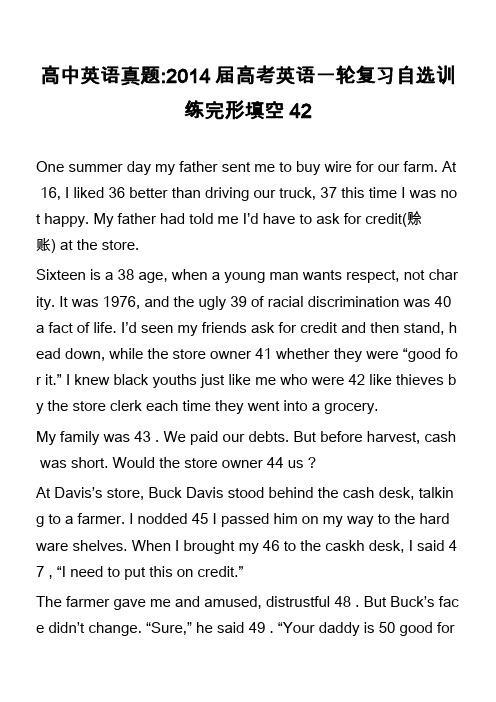
高中英语真题:2014届高考英语一轮复习自选训练完形填空42One summer day my father sent me to buy wire for our farm. At 16, I liked 36 better than driving our truck, 37 this time I was no t happy. My father had told me I’d have to ask for credit(赊账) at the store.Sixteen is a 38 age, when a young man wants respect, not char ity. It was 1976, and the ugly 39 of racial discrimination was 40 a fact of life. I’d seen my friends ask for credit and then stand, h ead down, while the store owner 41 whether they were “good fo r it.” I knew black youths just like me who were 42 like thieves b y the store clerk each time they went into a grocery.My family was 43 . We paid our debts. But before harvest, cash was short. Would the store owner 44 us ?At Davis’s store, Buck Davis stood behind the cash desk, talkin g to a farmer. I nodded 45 I passed him on my way to the hard ware shelves. When I brought my 46 to the caskh desk, I said 4 7 , “I need to put this on credit.”The farmer gave me and amused, distrustful 48 . But Buck’s fac e di dn’t change. “Sure,” he said 49 . “Your daddy is 50 good forit.” He 51 to the other man. “This here is one of James Williams ’s sons.”The farmer nodded in a neighborly 52 . I was filled with pride. J ames William’s son. Those three words had opened a door to a n adult’s respect and trust.That day I discovered that the good name my parents had 53 brought our whole family the respect of our neighbors. Everyon e knew what to 54 from a Williams: a decent person who kept hi s word and respected himself 55 much to do wrong.36. A. something B. nothing C. anything D. everything37. A. and B. so C. but D. for38. A. prideful B. wonderful C. respectful D. colorful39. A. intention B. shadow C. habit D. faith40. A. thus B. just C. still D. ever41. A. guessed B. suspected C. questioned D. figured42. A. watched B. caught C. dismissed D. accused43. A. generous B. honest C. friendly D. modest44. A. blame B. excuse C. charge D. trust45. A. until B. as C. once D. since46. A. purchases B. sales C. orders D. favorites47. A. casually B. confidently C. cheerfully D. carefully48. A. look B. stare C. response D. comment49. A. patiently B. eagerly C. easily D. proudly50. A generally B. never C. sometimes D. always51. A. pointed B. replied C. turned D. introduced52. A. sense B. way C. degree D. mood53. A. earned B. deserved C. given D. used54. A. receive B. expect C. collect D. require55. A. very B. so C. how D. too答案 36.B 37.C 38.A 39.B 40.C 41.C 42.A 43.B 44.D 45.B46.A 47.D 48.A 49.C 50.D 51.C 52.B 53.A 54.B 55.DI know I should have told the headmaster at the time .That was my real 36 .He had gone out of the study for some 37 , leaving me alone . In his absence I looked to see 38 was on his desk . In the 39 was a small piece of paper on which were written the 40 “English Writing Prize 1949. History Is a Series of Biographies (人物传记).”A(n) 41 boy would have avoided looking at the title as soon a s he saw the 42 . I did not . The subject of the English Writing Prize was kept a 43 until the start of the exam so I could not 44 reading it .When the headmaster 45 , I was looking out of the window .I should have told him what had 46 then . It would have been so 47 to say : “I’m sorry but I 48 the title for the English Wr iting Prize on your desk . You’ll have to 49 it.”The chance passed and I did not 50 it . I sat the exam the ne xt day and I won. I didn’t 51 to cheat , but it was still cheatin g anyhow .That was thirty-eight years 52 when I was fifteen . I have never told anyone about it before , 53 have I tried to explain to myself why not . The obvious explanation is that I could not admit I had seen me title 54 admitting that I had been looking at the things on his desk . 55 there must have been more behind it . Whatever it was , it has become a good example of how a little mistake can trap (使陷入)you in a more serious moral corner (道德困境). 36.A.plan B.fault C.grade D.luck 37.A.reason B.course C.exampleD.vacation38.A.this B.which C.that D.what 39.A.drawer B.corner C.middle D.box 40.A.names B.words C.ideas D.message s41.A.honest B.handsome C.friendlyD.active42.A.desk B.paper C.book D.answer 43.A.question B.key C.note D .secret 44.A.help B.consider C.practise D.forget 45.A.disappeared B.stayed C.returned D.went46.A.existed B.remained C.happened D.continued47.A.tiring B.easy C.important D.difficult 48.A.saw B.gave C.set D.made 49.A.repeat B.defend C.correct D.change 50.A.take B.have C.lose D.find 51.A.remember B.learn C.mean D.pretend 52.A.past B.ago C.then D.before 53.A.either B.never C.nor D.so 54.A.by B.besides C.through D.without 55.A.But B.ThoughC.Otherwise D.Therefore答案 36.B 37.A 38.D 39.C 40.B 41.A 42.B 43.D 44.A 45.C46.C 47.B 48.A 49.D 50.A 51.C 52.B 53.C 54.D 55.A 2014届高考英语一轮复习自选训练完形填空42One summer day my father sent me to buy wire for our farm. At 16, I liked 36 better than driving our truck, 37 this time I was not happy. My father had told me I’d have to ask for credit(赊账) at the store.Sixteen is a 38 age, when a young man wants respect, not charity. It was 1976, and the ugly 39 of racial discrimination was 40 a fact of life. I’d seen my friends ask for credit and then stand, h ead down, while the store owner 41 whether they were “good for it.” I knew black youths just lik e me who were 42 like thieves by the store clerk each time they went into a grocery.My family was 43 . We paid our debts. But before harvest, cash was short. Would the store own er 44 us ?At Davis’s store, Buck Davis stood behind the cash desk, talking to a farmer. I nodded 45 I pass ed him on my way to the hardware shelves. When I brought my 46 to the caskh desk, I said 47 ,“I need to put this on credit.”The farmer gave me and amused, distrustful 48 . But Buck’s face didn’t change. “Sure,” he said 49 . “Your daddy is 50 good for it.” He 51 to the other man. “This here is one of James Williams ’s sons.”The farmer nodded in a neighborly 52 . I was filled with pride. James William’s son. Those three words had opened a door to an adult’s respect and trust.That day I discovered that the good name my parents had 53 brought our whole family the res pect of our neighbors. Everyone knew what to 54 from a Williams: a decent person who kept his word and respected himself 55 much to do wrong.36. A. something B. nothing C. anything D. everything37. A. and B. so C. but D. for38. A. prideful B. wonderful C. respectful D. colorful39. A. intention B. shadow C. habit D. faith40. A. thus B. just C. still D. ever41. A. guessed B. suspected C. questioned D. figured42. A. watched B. caught C. dismissed D. accused43. A. generous B. honest C. friendly D. modest44. A. blame B. excuse C. charge D. trust45. A. until B. as C. once D. since46. A. purchases B. sales C. orders D. favorites47. A. casually B. confidently C. cheerfully D. carefully48. A. look B. stare C. response D. comment49. A. patiently B. eagerly C. easily D. proudly50. A generally B. never C. sometimes D. always51. A. pointed B. replied C. turned D. introduced52. A. sense B. way C. degree D. mood53. A. earned B. deserved C. given D. used54. A. receive B. expect C. collect D. require55. A. very B. so C. how D. too答案 36.B 37.C 38.A 39.B 40.C 41.C 42.A 43.B 44.D 45.B 46.A 47.D 48.A 49.C 50.D 51 .C 52.B 53.A 54.B 55.DI know I should have told the headmaster at the time .That was my real 36 .He had gone out of the study for some 37 , leaving me alone . In his absence I looked to see 38 was on his desk . In the 39 was a small piece of paper on which were written the 40 “English Writing Prize 1949. History Is a Series of Biographies (人物传记).”A(n) 41 boy would have avoided looking at the title as soon as he saw the 42 . I did not . The subject of the English Writing Prize was kept a 43 until the start of the exam so I could not44 reading it .When the headmaster 45 , I was looking out of the window .I should have told him what had 46 then . It would have been so 47 to say : “I’m sorry but I48 the title for the English Writing Prize on your desk . You’ll have to 49 it.”The chance passed and I did not 50 it . I sat the exam the next day and I won. I didn’t 51 t o cheat , but it was still cheating anyhow .That was thirty-eight years 52 when I was fifteen . I have never told anyone about it before , 53 have I tried to explain to myself why not .The obvious explanation is that I could not admit I had seen me title 54 admitting that I had be en looking at the things on his desk . 55 there must have been more behind it . Whatever it wa s , it has become a good example of how a little mistake can trap (使陷入)you in a more serious moral corner (道德困境).36.A.plan B.fault C.grade D.luck37.A.reason B.course C.example D.vacation38.A.this B.which C.that D.what39.A.drawer B.corner C.middle D.box40.A.names B.words C.ideas D.messages41.A.honest B.handsome C.friendly D.active42.A.desk B.paper C.book D.answer43.A.question B.key C.note D .secret44.A.help B.consider C.practise D.forget45.A.disappeared B.stayed C.returned D.went46.A.existed B.remained C.happened D.continued47.A.tiring B.easy C.important D.difficult48.A.saw B.gave C.set D.made49.A.repeat B.defend C.correct D.change50.A.take B.have C.lose D.find51.A.remember B.learn C.mean D.pretend52.A.past B.ago C.then D.before53.A.either B.never C.nor D.so54.A.by B.besides C.through D.without55.A.But B.Though C.Otherwise D.Therefore答案 36.B 37.A 38.D 39.C 40.B 41.A 42.B 43.D 44.A 45.C 46.C 47.B 48.A 49.D 50.A 51 .C 52.B 53.C 54.D 55.A。
2014年全国高考英语试题分类汇编 完型填空篇(含解析)
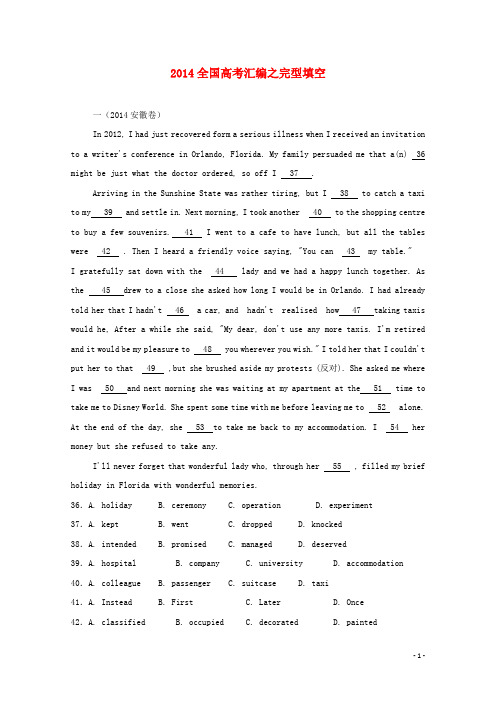
2014全国高考汇编之完型填空一(2014安徽卷)In 2012, I had just recovered form a serious illness when I received an invitation to a writer's conference in Orlando, Florida. My family persuaded me that a(n) 36 might be just what the doctor ordered, so off I 37 .Arriving in the Sunshine State was rather tiring, but I 38 to catch a taxi to my 39 and settle in. Next morning, I took another 40 to the shopping centre to buy a few souvenirs. 41 I went to a cafe to have lunch, but all the tables were 42 . Then I heard a friendly voice saying, "You can 43 my table."I gratefully sat down with the 44 lady and we had a happy lunch together. As the 45 drew to a close she asked how long I would be in Orlando. I had already told her that I hadn't 46 a car, and hadn't realised how 47 taking taxis would he, After a while she said, "My dear, don't use any more taxis. I'm retired and it would be my pleasure to 48 you wherever you wish." I told her that I couldn't put her to that 49 ,but she brushed aside my protests (反对). She asked me where I was 50 and next morning she was waiting at my apartment at the 51 time to take me to Disney World. She spent some time with me before leaving me to 52 alone. At the end of the day, she 53 to take me back to my accommodation. I 54 her money but she refused to take any.I'll never forget that wonderful lady who, through her 55 , filled my brief holiday in Florida with wonderful memories.36.A. holiday B. ceremony C. operation D. experiment37.A. kept B. went C. dropped D. knocked38.A. intended B. promised C. managed D. deserved39.A. hospital B. company C. university D. accommodation 40.A. colleague B. passenger C. suitcase D. taxi41.A. Instead B. First C. Later D. Once42.A. classified B. occupied C. decorated D. painted43.A. share B. reserve C. set D. possess44.A. old B. poor C. innocent D. stubborn45.A. journey B. meal C. speech D. interview46.A. donated B.repaired C. hired D. guided47.A.convenient B. worthwhile C. unfortunate D. expensive48.A.inspire B. entertain C. call D. drive49.A.business B. argument C. trouble D. challenge50.A.working B. staying C. moving D. shopping51.A.appointed B.limited C. favourite D. regular52.A. digest B. explore C.perform D. calculate53.A.forgot B. refused C. returned D.preferred54.A.sent B.lent C. offered D. owed55.A.confidence B. dignity C.curiosity D. kindness【考点】考察故事类完型填空【文章大意】刚刚从疾病中恢复的我到奥兰多去参加写作会议,在这个陌生的地方一位位老人用她的善良让我的假期充满了美好的回忆。
高考英语完形填空基础练习4
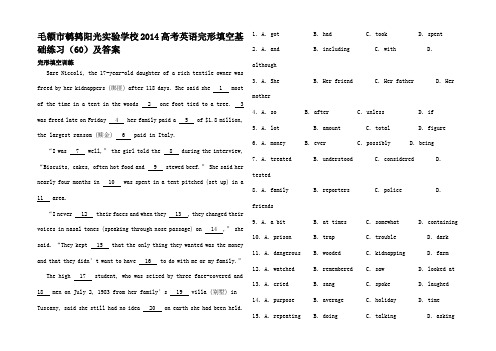
毛额市鹌鹑阳光实验学校2014高考英语完形填空基础练习(60)及答案完形填空训练Sare Niccoli, the 17-year-old daughter of a rich textile owner wasfreed by her kidnappers (绑匪) after 118 days. She said she 1 mostof the time in a tent in the woods 2 one foot tied to a tree. 3was freed late on Friday 4 her family paid a 5 of $1.8 million,the largest ransom (赎金) 6 paid in Italy.“I was 7 well,” the girl told the 8 during the interview,“Biscuits, cakes, often hot food and 9 stewed beef.” She said hernearly four months in 10 was spent in a tent pitched (set up) in a11 area.“I never 12 their faces and when they 13 , they changed theirvoices in nasal tones (speaking through nose passage) on 14 ,” shesaid. “They kept 15 that the only thing they wanted was the moneyand that they didn ’t want to have 16 to do with me or my family.”The high 17 student, who was seized by three face-covered and18 men on July 2, 1983 from her family ’s 19 villa (别墅) inTuscany, said she still had no idea 20 on earth she had been held.1. A. got B. had C. took D. spent2. A. and B. including C. with D. although3. A. She B. Her friend C. Her father D. Hermother4. A. so B. after C. unless D. if5. A. lot B. amount C. total D. figure6. A. money B. ever C. possibly D. being7. A. treated B. understood C. considered D.tested8. A. family B. reporters C. police D.friends9. A. a bit B. at times C. somewhat D. containing10. A. prison B. trap C. trouble D. dark11. A. dangerous B. wooded C. kidnapping D. farm12. A. watched B. remembered C. saw D. looked at13. A. cried B. sang C. spoke D. laughed14. A. purpose B. average C. holiday D. time15. A. repeating B. doing C. talking D. askingfor16. A. nothing B. something C. everything D. anything17. A. society B. family C. class D. school18. A. armed B. handed C. kidnapped D.terrified19. A. country B. city C. textile D. downtown20. A. which B. what C. why D. where完形填空训练(十五)1~5 DCABC 6~10 BABBC 11~15 BCCAA 16~20 DDAAD完形填空(记叙文)A few weeks after my first wife died, I was cooking dinner for my son and myself. For a vegetable, I decided on frozen 1 . As I was cutting open the bag, it slipped from my hands and crashed to the floor. The peas, like marbles, 2 everywhere. I tried to use a 3 , but with each swipe the peas rolled across the kitchen, 4 off the wall on the other side and rolled in another 5 . My mental state at the time was fragile. Losing my wife is an 6 pain. I got on my hands and knees and pulled them into a pile. I was half laughing and half crying as I 7 them. For the next week, every time I was in the 8 , I would find a pea that had9 my first clean up. In a corner, behind a table leg, or hidden undera heater, they kept 10 .I came to realize my 11 had been like that bag of frozen peas. My wife was gone. I was in a new city with a busy job and a son having trouble 12 to his new surroundings and the loss of his mother. I was a bag of spilled, frozen peas. My life had 13 and scattered. Then life gets you down. When you think you can never get through the 14 times, remember, it is just a bag of 15 , frozen peas. The peas can be collected and life will 16 . You will find all the peas. First the 17 peas, then the harder ones. When you 18 all the peas together, life will be whole again, but how fast you collect your peas 19 on you. Will you 20 scattering them around with a broom, or will you pick them up one-by-one and put your life back together?1. A. fish B. beef C. peas D. steak2. A. rolled B. escaped C. piled D. bounced3. A. broom B. vacuum C. mop D. shovel4. A. turned B. jumped C. ran D. bounced5. A. side B. way C. direction D. corner6. A. unusual B. extraordinary C. unbearable D. unbelievable7. A. swiped B. collected C. found D. picked8. A. office B. bedroom C. garden D. kitchen9. A. escaped B. fled C. missed D. skipped10. A. coming up B. coming out C. turning up D. turning out11. A. work B. family C. friends D. life12. A. fitting B. adjusting C. adopting D. applying13. A. come apart B. come down C. come up D. come back14. A. critical B. tough C. proud D. pleasant15. A. swiped B. lost C. scattered D. abandoned16. A. live on B. move on C. bring on D. come on17. A. easy B. missing C. nice D. delicious18. A. pile B. pushC. swipe D. pull19. A. attribute B. concentrate C. depend D. fix20. A. stop B. keep C. continue D. remain参考答案76.CAADC CBDAC DBABC BADCB :.完形填空(记叙文)Recently, I heard a touching story which illustrates the power that words can change a life—a power that 1 right in the hands of those reading this article. Mary had grown up knowing that she was different from the other kids, and she 2 it. She was born with a cleft palate(腭裂) and had to bear the jokes and stares of 3 children who teased her non-stop about her misshaped lip and confusing 4 . With all the teasing, Mary grew up hating the fact that she was“ 5 . ” She was 6 that no one, outside her family, could ever love her. . . until she 7 Mrs. Leonard’s class.Mrs. Leonard had a warm smile, a round face, and shiny brown hair. 8 everyone else in her class liked her, Mary 9 to love Mrs. Leonard. In the 1950’s, it w as 10 for teachers to give their children an annual hearing test. However, in Mary’s case, 11 her cleft palate, she was barely able to hear out of one ear. 12 not to let the other children have another “difference” to13 , she would cheat on the test each year. The “whisper test” was given by having a child walk to the classroom door, turn sideways, 14 one ear with a finger, and then 15 something which the teacher 16 . Mary turned her bad ear towards her teacher and 17 to cover her good ear. She knew that teachers would often say things like, “The sky is blue, ” or “What color are your shoes? ” But not on that day, 18 , God put seven words in Mrs. Leonard’s mouth that19 Mary’s life forever. When the “Whisper test”came, Mary heard the words: “I20 you were my little girl. ”1. A. stays B. hides C. remains D. lies2. A. liked B. hated C. accepted D. stood3. A. cruel B. kind C. naughty D. crazy4. A. idea B. speech C. story D. expression5. A. weak B. ill C. disabled D. different6. A. persuaded B. told C. convinced D. taught7. A. came B. entered C. admitted D. attended8. A. Although B. While C. As D. No matter9. A. came B. went C. set D. left10. A. ordinary B. general C. common D. regular11. A. in addition to B. as a result of C. in time of D. in spite of12. A. Supposed B. Determined C. Expected D. Convinced13. A. pick out B. work out C. give out D. point out14. A. block B. stop C. deafen D. close15. A. announce B. repeat C. recite D. declare16. A. gave B. shouted C. whispered D. said17. A. pretended B. started C. attempted D. refused18. A. strangely B. surely C. exactly D. reasonably19. A. changed B. improved C. extended D. affected20. A. hope B. think C. expect D. wish参考答案77.DBABD CBBAC ABDDB CABAD :完形填空练习(七十)“Down-to-earth” means someone or something that is honest, realistic and easy to deal with.It is a pleasure to 1 someone who is down-to-earth. A person who is down-to-earth is easy to talk to and 2 other people as equal. A down-to-earth person is just the 3 of someone who acts important or proud.Down-to-earth persons may be important members of 4 , of course. But they do not let their importance “ 5 to their heads.” They do not consider themselves to be better persons than 6 of less importance. Someone who is filled with his own importance and pride, 7 without cause, is said to have “his nose in the air”. There is 8 waya person with his nose in the air can be down-to-earth.Americans 9 another expression that means almost the same as “down-to-earth”. The expression is “both-feet-on-the-ground”. Someone 10 both-feet-on-the-ground is a person with a good 11 of reality. He has what is called “common sense”. He may have dreams, 12 he does not allow them to block his knowledge of 14 is real.The opposite kind of 14 is one who has his “head-in-the-clouds”.A man with his head-in-the-clouds is a 15 whose mind is not in the real world.16 such a person can be brought back to earth. Sharp words from teacher can usually 17 a day-dreaming student down-to-earth.Usually, the person who is down-to-earth is very 18 to have both feet on the ground. 19 we have both our feet on-the-ground, when we are down-to-earth, we act honestly and openly 20 others. Our lives are like the ground below us, solid and strong.1. A. pick B. choose C. find D. receive2. A. accepts B. recognizes C. thinks D. acts3. A. same B. kind C. example D. opposite4. A. companies B. society C. the world D. the government5. A. come B. appear C. enter D. go6. A. some B. others C. ones D. fellows7. A. often B. rarely C. yet D. still8. A. some B. a C. no D. every9. A. discover B. find C. conclude D. use10. A. at B. of C. with D. from11. A. idea B. understanding C. opinion D. feeling12. A. for B. or C. but D. and13. A. that B. what C. such D. which14. A. idea B. creature C. attitude D. person15. A. dreamer B. stranger C. flyer D. settler16. A. However B. Therefore C. Moreover D. sometimes17. A. teach B. bring C. lead D. take18. A. fit B. sure C. likely D. able19. A. When B. Since C. Though D. Unless20. A. toward B. with C. over D. onto 完形填空练习(七十)1~5 CADBD 6~10 BACDC 11~15 BCBDA 16~20 DBCAA******************************************************结束完形填空练习(五十五)Like many sisters, Abby and Eliza Davis couldn't be more different. Twelve-year-old Eliza is full of 1 , and always has something to say. Nine-year-old Abby is 2 . She’s happiest when she has a good book to read. Eliza 3 to be a lawyer or a clothes designer one day. She just can’t 4 to grow up and to away to college. Abby wants to bea doctor when she grows up. She works hard at math and science, her 5 subjects.Eliza is in the seventh grade. She gets up every day at 5:30, to 6 and blow-dry her hair. She’s ready to leave the house at 6:50, to 7 her friends by the store for breakfast. The children have a mile and a half to 8 to school, and the bell rings at 7:30.At 11:20, the children have their 9 . Some eat the hot dog, chicken pot pie, 10 other food that the school prepares for them, but Eliza would like to bring her own lunch in a lunchbox. At 2:15, classes are 11 and it’s time for sports. Eliza usually has tennis practice 12 4:30. She’s tired by the time her mother comes to get her in the car, but she still has two or three hours of 13 to do before she goes to bed.Abby is in the fourth grade at Broken Ground School. Sh e’s lucky. Her school has big modern 14 , first-class teacher, and an excellent library. The playground is surrounded by beautiful 15 , where Indians once camped.Like many American school children, Abby starts the day by saluting the American 16 hanging in her classroom. Then work begins. Today, She's writing a composition about her summer holidays. Her pencil 17 busily across the paper.Abby will finish her story at home this evening, 18 Eliza does her homework. Will they work together 19 , or will they fight?“Well,” says Abby, “We have arguments, but we get along pretty well. About fifty-fifty,” I’d say. “That ’s not 20 for two such different sisters, is it?”1. A. power B. energy C. strength D. courage2. A. quieter B. younger C. noisier D. harder3. A. needs B. has C. agrees D. wants4. A. refuse B. accept C. wait D. wish5. A. best B. lovely C. fortunate D. favourite6. A. wash B. clean C. brush D. comb7. A. welcome B. meet C. see D. receive 8. A. drive B. move C. walk D. travel9. A. lunch B. cooking C. game D. supper 10. A. besides B. except C. without D. or 11. A. given B. prepared C. finished D. started 12. A. at B. by C. after D. until13. A. housework B. homework C. cleaning D. washing 14. A. offices B. blackboards C. classrooms D. windows 15. A. buildings B. pools C. forest D. woods16. A. flag B. map C. history D. people 17. A. jumps B. leans C. lies D. moves18. A. while B. and C. if D. then 19. A. happily B. constantly C. peacefully D. carefully20. A. bad B. fair C. equal D. usual 完形填空练习(五十五)1~5 BADCD 6~10 ABCAD 11~15 CDBCD 16~20 ADACA。
高中英语真题-2014高考英语阅读理解精品训练(4)及答案解析

高中英语真题:2014高考英语阅读理解精品训练(4)及答案解析A(2011·东北三省四市联考,B)You're in a department store and you see a couple of attractive young women looking at a sweater. You listen to their convers ation: “I can't believe it—Lorenzo Bertolla! They are almost impossible to find. Isn't it bea utiful? And it's a lot cheaper than the one Sara bought in Rome.”They leave and you go over to see this incredible sweater. It's nice and the price is right. You've never heard of Lorenzo Bertol la, but those girls looked really stylish. They must know. So,you buy it. You never realize that those young women are empl oyees of an advertising agency. They are actually paid to go fro m store to store, talking loudly about Lorenzo Bertolla clothes. Every day we notice what people are wearing, driving and eatin g. If the person looks cool, the product seems cool, too. This is t he secret of undercover marketing. Companies from Ford to Nik e are starting to use it.Undercover marketing is important because it reaches people t hat don't pay attention to traditional advertising. This is particula rly true of the MTV generation—consumers between the age of 18 and 34. It's a golden group. They have a lot of money to spend,but they don't trust ads. So advertising agencies hire young actors to“perform” in bars a nd other places where young adults go. Some people might call this practice misleading, but marketing executive Jonathan Res sler calls it creative. “Look at traditional advertising. Its effective ness is decreasing. ”It is true,because everyone knows an ad is trying to persuade you to buy something. However,you don't know when a conversation you overhear is just a perf ormance.本文是说明文。
山西省广灵县第一中学2014届高考英语一轮复习 Unit 4 Body language单元综合测试 新人教版必修4
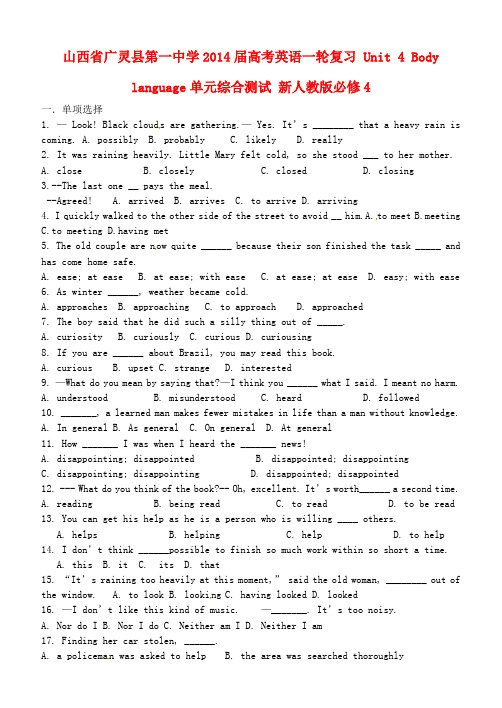
山西省广灵县第一中学2014届高考英语一轮复习 Unit 4 Bodylanguage单元综合测试新人教版必修4一.单项选择1. — Look! Black cloud s are gathering.—Yes. It’s ________ that a heavy rain is coming. A. possibly B. probably C. likely D. really2. It was raining heavily. Little Mary felt cold, so she stood ___ to her mother.A. closeB. closelyC. closedD. closing3.--The last one __ pays the meal.--Agreed! A. arrived B. arrives C. to arrive D. arriving4. I quickly walked to the other side of the street to avoid __ him.A.to meet B.meetingC.to meetingD.having met5. The old couple are n ow quite ______ because their son finished the task _____ and has come home safe.A. ease; at easeB. at ease; with easeC. at ease; at easeD. easy; with ease6. As winter ______, weather became cold.A. approachesB. approachingC. to approachD. approached7. The boy said that he did such a silly thing out of _____.A. curiosityB. curiouslyC. curiousD. curiousing8. If you are ______ about Brazil, you may read this book.A. curiousB. upsetC. strangeD. interested9. —What do you mean by saying that?—I think you ______ what I said. I meant no harm.A. understoodB. misunderstoodC. heardD. followed10. _______, a learned man makes fewer mistakes in life than a man without knowledge.A. In generalB. As generalC. On generalD. At general11. How _______ I was when I heard the _______ news!A. disappointing; disappointedB. disappointed; disappointingC. disappointing; disappointingD. disappointed; disappointed12. --- What do you think of the book?-- Oh, excellent. It’s worth______ a second time.A. readingB. being readC. to readD. to be read13. You can get his help as he is a person who is willing ____ others.A. helpsB. helpingC. helpD. to help14. I don’t think ______possible to finish so much work within so short a time.A. thisB. itC. itsD. that15. “It’s raining too heavily at this moment,” said the old woman, ________ out of the window. A. to look B. looki ng C. having looked D. looked16. —I don’t like this kind of music.—_______. It’s too noisy.A. Nor do IB. Nor I doC. Neither am ID. Neither I am17. Finding her car stolen, ______.A. a policema n was asked to helpB. the area was searched thoroughlyC. it was looked for everywhereD. she hurried to a policeman for help18. _______ in the queue for half an hour, Tom suddenly realized that he had left his wallet at home.A. To waitB. Have waitedC. Having waitedD. To have waited19. People from France do not behave in the same way we Chinese people do.A. whatB. whichC. at whichD. /20. —Do you know the tall man ______ to Mr. King over there?—Sorry, I don’t know him. A. to speak B. speaking C. is speaking D. has spoken21. Three students ______ Dongshan Middle School took part in the Oral English Competition. A. represent B. are representing C. represen ting D. represented 22. ----Can you _c_ yourself to others in English, Mary? ----Sorry, I can not ___ myselfin English. A. express; introduce B. express; expressC. introduce; expressD. introduce; introduce23. Mary____ politics in the university but now she is going into business.A. majored inB. majorityC. majorD. major in24. Immediate action should be____ to prevent people from being affected by the bird flu. A. Made B. brought C. taken D. paid25. Only after you finish your work ____TV. A.you are allowed to watchB.are you allowed watchingC.are you allowed to watchD.can you be able to watch 第二节完形填空The contractor (订约人) was 30 to see his good worker go & asked if he could build just one more house as a 31 . The carpenter said yes, but over time it was easy to see that his 32 was not in his work. He resorted to shoddy workmanship and used 33 materials. It was an 34 way to end a dedicated career.When the carpenter finished his work, his employer came to 35 the house. Then he handed the 36 to the carpenter and said, "This is your house... my gift to you." The carpenter was 37 !What a shame! If he had only known he was building his own house, he would have doneit all so 38 .So it is with us. We build 39 , a day at a time, often putting 40 our best into the building. Then, with a shock, we 41 we have to live in the house we have built. If we could do it over, we would do it much differently.But, you cannot 42 . You are the carpenter, and every day you hammer a nail, placea board, or erect a wall. Someone once said, "Life is a do-it-yourself project." Your43 , and the choices you make today, help build the "house" you will live in tomorrow.44 , build 45 !26. A. leave B. lead C. avoid D. gain27. A. depend B. cheer C. enjoy D. satisfy28. A. depend on B. receive C. benefit from D. miss29. A. so B. but C. when D. even if30. A. sorry B. glad C. disappointed D. cheerful31. A. service B. personal favour C. work D. good end32. A. curiosity B. energy C. heart D. patience33. A. less good B. best C. solid D. valuable34. A. rude B. wise C. wonderful D. unfortunate35. A. sell B. buy C. inspect D. admire36. A. house B. front-door key C. gift D. award37. A. shocked B. satisfied C. silly D. tired38. A. secretly B. rapidly C. willingly D. differently39. A. our houses B. our lives C. our building D. our work40. A. less than B. more than C. no more than D. no less than41. A. promise B. decide C. realize D. consider42. A. throw away B. apologize C. go ahead D. go back43. A. character B. attitude C. force D. honesty44. A. Th erefore B. However C. Obviously D. Instead45. A. simply B. personally C. gradually D. wisely第三部分:阅读理解 EmpathyLast year, researchers from the University of Michigan reported that empathy, the ability to understand other people, among college students had dropped sharply over the past 10 years. __46_ Today, people spend more time alone and are less likely to join groups and clubs.Jennifer Freed, a co-director of a teen program, has another explanation. Turn on the TV, and you’re showered with news and reality shows full of people fighting, competing, and generally treating one another with no respect. __47__There are good reasons not to follow those bad examples. Humans are socially related by nature. __48_ Researchers have also found that empathetic teenagers are more likely to have high self-respect. Besides, empathy can be a cure for loneliness, sadness, anxiety, and fear.Empathy is also an indication of a good leader. In fact, Freed says, many top companies report that empathy is one of the most important things they look for in new managers. __49_ “Academics are important. But if you don’t have emotional (情感的) intelligence, you won’t be as successful in work or in your love life,” she says.What’s the best way to up your EQ (情商)? For starters, let down your guard and really listen to others. __50__To really develop empathy, you’d better volunt eer at a nursing home or a hospital, join a club or a team that has a diverse membership, have a “sharing circle” withyour family, or spend time caring for pets at an animal shelter.Everyone is different, and levels of empathy differ from person to person.That could be because so many people have replaced face time with screen time, the researchers said.“One doesn’t develop empathy by having a lot of opinions and doi ng a lot of talking,” Freed says.Humans learn by example—and most of the examples on it are anything but empathetic. Empathy is a matter of learning how to understand someone else—both what they think and how they feel.Good social skills—including empathy—are a kind of “emotional intelligence” that will help you succeed in many areas of life.Having relationships with other people is an important part of being human—and having empathy is decisive to those relationships.Unit 4 Body language参考答案一. 1—5 C A D B B 6-10 B A A B A 11-15 B A D B B16-20 A D C D B 21-25 C C A C C二.26-30 ACDBA 31-35 BCADC 36-40 BADBA 41-45 CDBAD三.【答案】46.B 后句中people spend more time alone and are less likely to join groups and clubs,所以前句应为原因that could be because47.D 前文中人们打开电视看到的是fighting, competing, and generally treating one another with no respect后句人们从中学到的是这样的例子,Humans learn by examples.下段中出现bad examples48.G Humans are socially related by nature,人类是社会性的,having relationship with other people is an important part of being human.49.F Academics are important ,but if you don’t have emotional intelligence,于是前句是social skills50.C 怎样提高EQ?let down your guard and really listen to others,one doesn’t develop empathy by h aving a lot of opinions .。
高考英语 完形填空阅读理解训练题_4
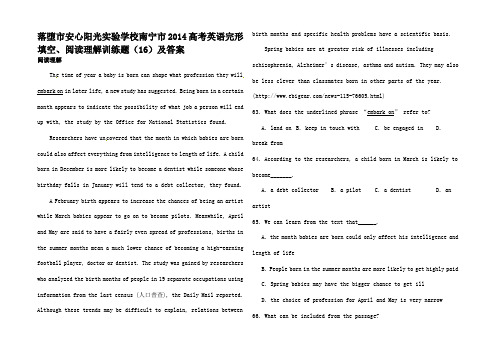
落堕市安心阳光实验学校南宁市2014高考英语完形填空、阅读理解训练题(16)及答案阅读理解The time of year a baby is born can shape what profession they will embark on in later life, a new study has suggested. Being born in a certain month appears to indicate the possibility of what job a person will end up with, the study by the Office for National Statistics found.Researchers have uncovered that the month in which babies are born could also affect everything from intelligence to length of life. A child born in December is more likely to become a dentist while someone whose birthday falls in January will tend to a debt collector, they found.A February birth appears to increase the chances of being an artist while March babies appear to go on to become pilots. Meanwhile, April and May are said to have a fairly even spread of professions, births in the summer months mean a much lower chance of becoming a high-earning football player, doctor or dentist. The study was gained by researchers who analyzed the birth months of people in 19 separate occupations using information from the last census (人口普查), the Daily Mail reported. Although these trends may be difficult to explain, relations between birth months and specific health problems have a scientific basis.Spring babies are at greater risk of illnesses including schizophrenia, Alzheimer’s disease, asthma and autism. They may also be less clever than classmates born in other parts of the year. (/news-115-76605.html)63. What does the und erlined phrase “embark on” refer to?A. land onB. keep in touch withC. be engaged inD. break from64. According to the researchers, a child born in March is likely to become_______.A. a debt collectorB. a pilotC. a dentistD. an artist65. We can learn from the text that______.A. the month babies are born could only affect his intelligence and length of lifeB. People born in the summer months are more likely to get highly paidC. Spring babies may have the bigger chance to get illD. the choice of profession for April and May is very narrow66. What can be included from the passage?A. There exist connections between birth date and occupationsB. The fate has been already decided when people are bornC. People born in Autumn would be more successful than those born in SpringD. The time of year one is born decides which specific health problems one has参考答案63—66 CBCAI ran across a dim photo of him the other day, going through some old things. He’s been dead for 25 years. His name was Rex.1 was his favorite recreation (娱乐). He had so much2 in the water as any person I have known. You didn’t have to throw a stick in the water to3 him to go in. Of course, he would bring back a stick to you if you4 throw one in.That 5 me of the night, 6 he brought back a small chest that he found somewhere how 7 nobody ever knew. Since it was Rex, it 8 easily have been half a mile. The chest wasn’t a good one. It was just a 9 old piece that somebody 10 . Still, it was something he wanted, probably 11 it presented a nice problem in transportation. It tested his courage. We first knew about his achievement when, deep in the night, we 12 him trying to get the cheat up onto the porch (门厅). It sounded 13 two or three people were trying to tear the house 14 . We came downstairs and turned on the 15 light. Rex was on the top step trying to pull the thing up, but it had 16 somehow and he was just holding his own. I suppose he would have held his own 17 dawn if we hadn’t helped him. The next day we carted the chest miles away and threw it out. If we had thrown it out in a 18 place, he would have brought it home again, as a small token (象征) of his strength in such matters. 19 , he had been taught to carry heavy wooden objects about and he was 20 of his skill.1. A. Fighting B. Swimming C. Barking D. Running2. A. fun B. trouble C. danger D. difficulty3. A. stop B. make C. get D. have4. A. will B. do C. did D. would5. A. reminds B. warns C. tells D. suggests6. A. which B. while C. as D. when7. A. far B. long C. old D. heavy8. A. could B. can C. should D. would9. A. priceless B. worthless C. valuable D. important10. A. kept B. forgot C. deserted D. remained11. A. because B. only if C. even if D. incase12. A. saw B. heard C. watched D. caught13. A. like B. that C. as if D. at least14. A. up B. in C. away D. down15. A. hall B. kitchen C. bedroom D. porch16. A. rolled B. stopped C. caught D. broken17. A. at B. before C. till D. during18. A. distant B. nearby C. silent D. busy19. A. In all B. As a result C. At last D. After all20. A. proud B. tired C. ashamed D. doubtful1~5 BACCA 6~10 DAABC11~15 ABCDD 16~20 CCBDA***************************************************结束每日一句After seeing plenty of solid evidence, the greedy thief had no alternative but to acknowledge that it was he that stole the gold watch.在看见了许多的铁证之后,这个贪婪的贼不得不承认是他偷了金表。
- 1、下载文档前请自行甄别文档内容的完整性,平台不提供额外的编辑、内容补充、找答案等附加服务。
- 2、"仅部分预览"的文档,不可在线预览部分如存在完整性等问题,可反馈申请退款(可完整预览的文档不适用该条件!)。
- 3、如文档侵犯您的权益,请联系客服反馈,我们会尽快为您处理(人工客服工作时间:9:00-18:30)。
2014高考英语完形填空一轮练习(4)及答案或解析(*******)The Town of Pressure and the Town of Pleasure were neighbors but had nothing in common. Residents built walls to 1 influence from the other town.In Pressure, 2 struggled to be the very best. When women gave birth, they would 3 to have the baby with the loudest cry. There was violent competition in every aspect of life. Because 4 was the index (指数) of success, people were 5 busy making money, with 6 for relaxation. Some young people couldn’t bear the intensity and resorted to drink or drugs to escape.7 , over in Pleasure, the motto was “As long as you like it, do it.”People grew up without 8 and 9 do anything they liked. Children played computer games day and night. At school, teachers didn’t 10 whether students showed up or not. Workers might sit around the office 11 sipping coffee and doing nothing. 12 the lack of regulations, nobody worried about losing their jobs. It was 13 that mattered. No one had the 14 thought of moving forward, either for themselves or for the town. The computers they used were 15 models from Pressure.Some of the young were addicted to 16 because of the meaninglessness of their lives. Then, people in the two towns began asking themselves, “What is 17 for?”But, just before life in the two towns completely 18 , there came a saint – Mr. Reason. He went from door to door, talking with people and giving advice. People in Pressure learnt to be 19 with what they had, while people in Pleasure began to make plans. They 20 the walls between them and built a road to connect the two. The towns’ people came to realize the truth—there is no space between Pressure and Pleasure if they don’t go to extremes.1. A. connect B. keep C. keep out D. prevent2. A. everyone B. anyone C. nobody D. somebody3. A. have B. like C. compete D. try4. A. health B. joy C. children D. wealth5. A. seldom B. always C. hardly D. sometimes6. A. much time B. no reason C. many reasons D. no time7. A. Meanwhile B. At the same time C. Therefore D. Virtually8. A. pleasure B. pressure C. work D. happiness9. A. must B. need C. could D. dared10. A. know B. find C. recognize D. care11. A. in the morning B. in the evening C. all day long D. in the afternoon12. A. Thanks to B. Regardless of C. Owe to D. According to13. A. money B. time C. pleasure D. pressure14. A. strongest B. slightest C. most D. smallest15. A. the old B. the new C. the best D. the same16. A. books B. work C. money D. drugs17. A. pressure B. life C. pleasure D. money18. A. improved B. failed C. succeeded D. lived19. A. content B. surprised C. patient D. angry20A. built B. put down C. pulled down D. set up(******)1~5 CDACDB 6~10 DABCD11~15 CACBA 16~20 DBBAC***********************************************************结束、完形填空(共20小题; 每小题1.5分,满分30分)Children find meanings in their old family tales.When Stephen Guyer’s three children were growing up, h e told them stories about how his grandfather, a banker, 36 all in the 1930s, but did not lose sight of what he valued most. In one of the darkest times 37 his strong-minded grandfatherwas nearly 38 , he loaded his family into the car and 39 them to see family members in Canada with a 40 , “there are more important thin gs in life than money. ”The 41 took on a new meaning recently when Mr. Guyer downsized to a 42 house from a more expensive and comfortable one. He was 43 that his children ,a daughter, 15, and twins, 22, would be upset. To his surprise, they weren’t. 44 , their reaction echoed (共鸣) their great-grandfather’s. What they 45 was how warm the people were in the house and how 46 of their heart was accessible.Many parents are finding family stories have surprising power to help children 47 hard times. Storytelling experts say the phenomenon reflects a growing 48 in telling tales, evidenced by a rise in a storytelling events and festivals.A university 49 of 65 families with children aged from 14 to 16 found kids’ ability to50 parents’ stories was linked to a lower rate of anger and anxiety.The 51 is telling the stories in a way children can 52 . We’re not talking here about the kind of story that 53 , “ When I was a kid, I walked to school every day uphill both ways, barefoot in the snow. ” Instead, we should choose a story suited to the child’s 54 , and make eye contact (接触)to create “a personal experience”.We don’t have to tell children55 they should take from the story and what the moral is . ”36. A. missed B. lost C. forgot D.ignored37. A. when B. while C. how D. why38. A. friendless B. worthless C. penniless D. homeless39. A fetched B. allowed C. expected D. took40. A. hope B. promise C. suggestion D.belief41. A. tale B. agreement C. arrangement D.report42. A. large B. small C. new D. grand43. A. surprised B. annoyed C. disappointed D. worried44. A. Therefore B. Besides C. Instead D. Otherwise45. A. talked about B. cared about C. wrote aboutD.heard about46. A. much B. many C. little D. few47. A. beyond B. over C. behind D.through48. A. argument B. skill C. interest D.anxiety49. A. study B. design C. committee D. staff50. A. provide B. retell C. support D. refuse51. A. trouble B. gift C. fact D. trick52. A. perform B. write C. hear D. question53. A. means B. ends C. begins D. proves54. A. needs B. activities C. judgments D. habits55. A. that B. what C. which D. whom**********************************************************结束阅读理解Most people,when they travel to space,would like to stay in orbit for a few days or more.And this stands to reason,if you’re paying D|S20,000 for your trip to orbit! So in order for tourism to reach its full potential there’s going to be a need for orbital accommodation—or space hotels.What would a space hotel actually be like to visit? Hotels in orbit will offer the services you expect from a hotel—private rooms,meals,bars.But they’ll also offer two unique experiences: impressive views—of Earth and space—and the endless entertainment of living in zero gravity—including sports and other activities that make use of this.The hotels themselves will vary greatly—from being quite simple in the early days to huge luxury structures at a later date.It’s actually surpris ing that as later as 1997,very few designs for space hotels were published.This is mainly because those who might be expected to design them haven’t expected launch costs to come down far enough to make them possible.Lots of people who’ve been to space have described vividly what it’s like to live in zero gravity.There are obviously all sorts of possibilities for dancing,gymnastics,and zero—G sports.Luckily,you don’t need to sleep much living in zero gravity,so you’ll have plenty of time for relaxing by ha nging out in a bar with a window looking down at the turning Earth below.Of course all good things have come to an end,unfortunately.And so after a few daysyou’ll find yourself heading back though you’ll be much more expert at exercising in zero gravity than you were when you arrived.You’ll be thinking how soon you can save up enough to get back up again—or maybe you should change jobs to get to work in an orbiting hotel.【文章大意】这是一篇科普说明文,主要介绍了在太空旅行中住宿的地方——太空宾馆(space hotels),独特的体验如欣赏太空美景,在失重的状态下的无穷乐趣。
